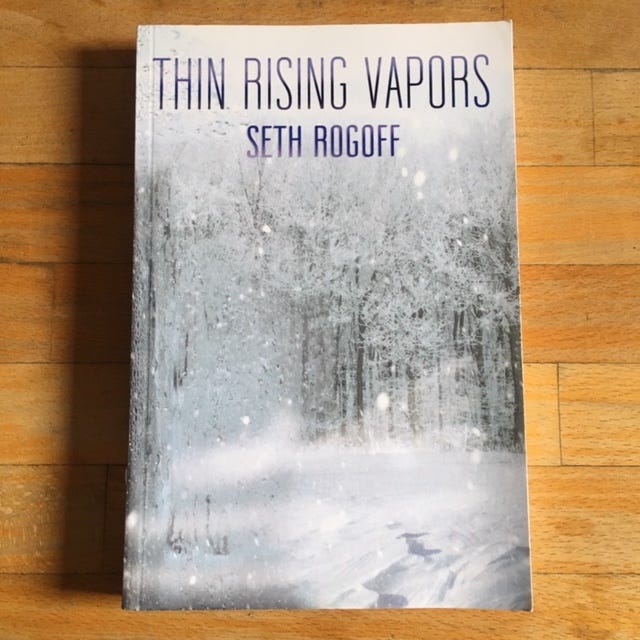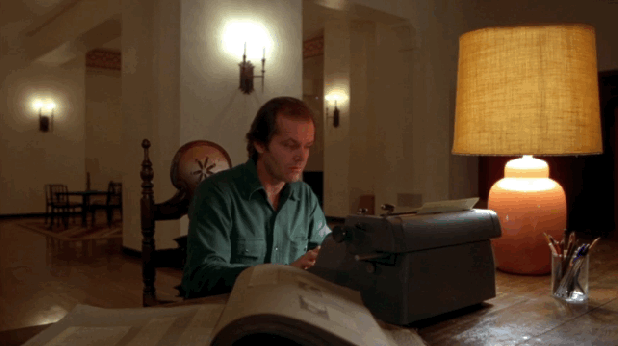Books on GIF #102 — 'Thin Rising Vapors' by Seth Rogoff

Welcome to the latest edition of Books on GIF, the animated alternative to boring book reviews. This Sunday's selection is ‘Thin Rising Vapors’ by Seth Rogoff.

Longtime readers of Books on GIF may remember that I loved Seth Rogoff’s debut novel, ‘First, the Raven: A Preface,’ saying it was ‘fresh and original and good, and I couldn't put it down.’ So when the good folks at Sagging Meniscus Press sent along Rogoff’s second effort, ‘Thin Rising Vapors,’ I was like:

I took it with me on a recent vacation to Southern California; I started it in Los Angeles and finished it in the desert. Here’s a picture of my favorite dead tree in the Mojave:

This has nothing to do with the book, it’s just something beautiful, and I want to share it. Anyway, in ‘Vapors,’ protagonist Ezra has inherited a house in the Maine woods where his best friend, Abel, had for years lived a hermit-like life prior to killing himself with poisonous mushrooms. Ezra, a professor of medieval Jewish studies, arrives at the house to rummage through the papers left behind by his friend, an enigmatic genius he hasn’t seen in years, to figure out what drove him to suicide. Each chapter represents a day of Ezra’s quest. He finds that his friend has been spending his time typing unsent letters, which are stashed in the attic, and diary entries that are a mashup of quotes from Henry David Thoreau (another hermit), recollections of dreams, a recounting of his relationships with two sisters from down the road and sparring matches with their neoconservative friend who works for the State Department. The friend knows of Abel from some writing Abel did about the environment, and he tries to provoke Abel out of his intellectual and physical seclusion while beating him at games of chess. From all this written material read to us by Ezra, I think we are supposed to deduce that Abel was having some kind of descent into madness. The setup of a guy slowly going nuts in the solitude of Maine while bent over a typewriter reminded me of ‘The Shining’:

Rogoff writes beautifully. I saw him read an excerpt of this book at the wonderful KGB Bar in the East Village a few months back, and it was a real treat to hear his sentences out loud. But while this book is well written, it initially frustrated me because I thought it raised a lot of questions that went unanswered. For example, Ezra becomes so overwhelmed by his grief and by the intensity of what he uncovers that he abandons his investigation. Ezra’s reaction feels very human, but doesn’t seem to work for storytelling purposes. I mean, what’s the point of writing a book about someone trying to figure out why their friend died if there’s no payoff? (I’ll come back to this.) I was annoyed, and my pique led me to conjure up nitpicks. What was the metaphorical significance of the loon? What was the meaning of the novel Abel’s mother wrote? What about the photograph Ezra finds? How about the painting? Why does Ezra’s wife back home not call the police after he goes a week without plugging in his phone? How does Ezra remain constipated after drinking an entire bottle of whiskey? For real, I was like:

I thought about this book for a week, and couldn’t even start a new one while my mind chewed on it. What was Rogoff after here? I understand that artists don’t need to provide answers to questions they raise in their work, but art without perspective is amateurish. It wasn’t until I started writing this review, and reread the forward as I typed it below, that I realized I was probably thinking about this book in the wrong way. What if Abel’s death and Ezra’s investigation of it are irrelevant? Maybe Rogoff is instead trying to warn us about the peril of choosing to be a political, intellectual or social hermit in this current climate. While it is tempting to want to just get away from Twitter trolls and all the horrible headlines about mass shootings and racism and all the other evils of the world and go live like Thoreau in the forest (or the desert, which I thought about moving to several times while on my trip), maybe that’s a path that leads to our death. I don’t know if this is right, but the more I think about it, the less frustrated I feel. Regardless, Rogoff has given me a lot to think about with ‘Thin Rising Vapors,’ and I’m going to noodle on this some more like:

How it begins:
It has been over six years since I went to Abel’s house in Casco. From that time, the time of his death, the house has belonged to me. Despite this, I haven’t been back there on a single occasion. It’s likely I’ll never return. When I left the house on that morning in late November 2011, I took all of Abel’s papers with me. I had intended to do a thorough study of them to discover something like a deeper truth about my friend’s life. In the weeks and months that followed, I managed to produce an account of my seven days in Casco—to retrace my steps. I could go no further.
Since my initial surge of work during that winter, the massive stacks of Abel’s papers, notebooks, and boxes have remained where I placed them—piled high on the floor of my office in Whitefield Hall, on bookshelves, and crammed in drawers. For sure, the stacks have now and then been knocked over. A breeze has blown some pages around. Coffee has spilled and stained them. Dust gathers everywhere. But they are here with me and form an archive I feel compelled to preserve but cannot bring myself to examine. At some point, who knows when, the time for such an investigation will come. The publication of these tracings is, I hope, the beginning of the process, a beginning that at the same time could very well be an endpoint. I don’t know. I sense, though, that at this moment of disquiet and rising extremism, I cannot keep Abel Prager to myself any longer. His all-too-brief life suggests a type of radical resistance—a perfectly struck note of discord. Such a note of discord has become, for me, part of the general earth song, the likes of which, as you’ll find later on, Henry David Thoreau would hear when the sound of the crickets in the field would fade toward silence.
Ezra Stern
Whitefield Hall
January 1, 2018My rating:

‘Thin Rising Vapors’ by Seth Rogoff was published by Sagging Meniscus Press in 2018. 240 pages. I received a copy from the publisher.
Before I go, I should mention that it’s almost your last chance to order a limited-edition Books on GIF ‘Hard G’ T-shirt designed by the awesome This is a Dispatch. Head over to booksongif.bigcartel.com and order one before sales close at 10 p.m. Eastern on Sunday, March 31. Don’t miss out!

In case you missed it: Books on GIF #101 featured ‘Asymmetry’ by Lisa Halliday.
What’s next: In two weeks you’ll get a review of ‘Postcards From the Edge’ by Carrie Fisher. Also in the queue are ‘Our Lady of the Nile’ by Scholastique Mukasonga, ‘The Deeper the Water the Uglier the Fish’ by Katya Apekina and ‘The Friend’ by Sigrid Nunez, among others.
Shoot me an email if there’s a bestseller, a classic or a forgotten gem you want reviewed.
Follow me on Twitter and Instagram.
Thanks for reading, and thanks especially to Donna for editing this review!
Until next time,

MPV



